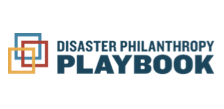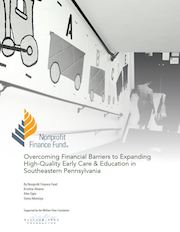Case Study

This Playbook is the comprehensive resource of best practices and innovative approaches to guide the philanthropic community in preparing for and responding to future disasters.
The Silicon Valley Out-of-School-Time Collaborative invested in a cohort of regional nonprofit organizations to sustain and strengthen their ability to serve more students with stronger academic and social-emotional programming. A midcourse evaluation of the collaborative showed that grantees were stronger, programs were better and are reaching more students, and funders had adopted new, collaborative grantmaking practices. A second phase of the work was committed to more flexibility –– letting grantees drive the group’s planning and learning efforts, and manage consultants, budgeting and group communications. Grantees also opted to redirect the focus of the collaborative from capacity building to program development and evaluation, with the added goal of sharing effective afterschool and summer program models with others, both inside and outside the region.

Case study from Philanthropy New York documenting the formation, challenges and ultimate success of the Education Funders Research Initiative – an unusual funder collaborative that brought together funders for and against charter schools, funders with different views of testing and accountability, and funders with vastly different approaches to supporting education reform to identify and advance shared priorities.
n 2004, a group of foundations came together to create a funder collaborative in support of Freedom to Marry’s state-by-state strategy to win marriage equality. Over the following 11 years, this unique collaborative and its funding partners invested a total of $153 million to support a wide range of activities across the country to change hearts and minds on a massive scale — and ultimately to deliver a historic win for equality and love.
This case study examines the experience of the Corporation for Supportive Housing as it worked with the nonprofit consultancy AchieveMission to understand and adopt better human capital management plans and practices.
D5′s State of the Work 2013 features lessons learned from executives of the American Express Foundation, the Baltimore Community Foundation, Access Strategies Fund, the Silicon Valley Community Foundation, Lloyd A. Fry Foundation,...
A growing number of foundations and philanthropists have elected to give away their money by a fixed date rather than establish perpetual foundations.
This report from the James Irvine Foundation provides practical tools to help you take on leadership roles in your community, with insights and experiences from a variety of community foundations.
